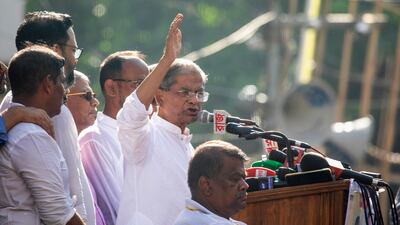Bangladesh's main opposition party has asked India to extradite former prime minister Sheikh Hasina to face trial for alleged crimes after she fled Dhaka amid deadly student protests demanding her removal from office.
Ms Hasina resigned abruptly and fled to the Indian capital New Delhi on August 5 after demonstrators stormed her residence in the Bangladeshi capital, culminating weeks of deadly protests by students against a government job policy that became a nationwide movement against her nearly 16-year rule.
Mirza Fakhrul Islam Alamgir, secretary general of Bangladesh Nationalist Party, made the plea to the Indian government. “It is our call to you that you should hand her over to the government of Bangladesh in a legal way," he said.
"The people of this country have decided to conduct her trial. Let her face that trial. He also accused Ms Hasina of starting "various plots to thwart the revolution that happened in Bangladesh".
Ms Hasina, 76, head of the Awami League party, is near New Delhi in a secure location, according to the Indian government and the leaders’ relatives, after fleeing Dhaka by helicopter.
She has been accused by critics of crushing her political rivals, including the main opposition, and her government has been under suspicion of human rights abuse, murder, abduction and extortion.
At least 15 cases of murder and “crimes against humanity” have been filed by police against Ms Hasina since she fled, including killings during the student-led movement.

More than 450 people, mostly students, were killed in July and August.
Three separate cases of “mass murder” are being investigated by the Bangladeshi War Crimes Tribunal, a body the former prime minister set up in 2010 to investigate crimes committed during the country's liberation war against Pakistan in 1971.
New Delhi, which has historically shared good relations with Ms Hasina, can turn down the request because Article 8 of the extradition treaty between the countries allows the signatories to refuse requests that have “not been made in good faith and in the interests of justice”.
A UN human rights team will visit Dhaka this week to discuss investigations into the allegations during the unrest with Bangladesh’s interim government, now led by Nobel laureate Muhammad Yunus.


